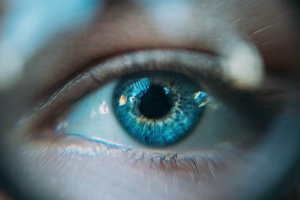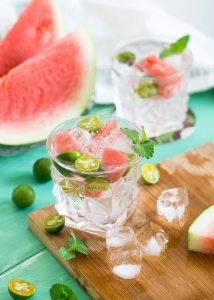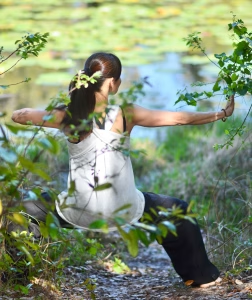Acupuncture
Acupuncture for Styes and Eyes

A patient came in recently with the beginnings of a stye. Her left eye hurt and if she pulled her upper eyelid up, she was able to see enough minor inflammation to cause concern. “It always happens around this time of year,” she said. Why? Why?
Why did her eye stye fly (upwards)?
The eyes—especially and specifically the eyelids—are surrounded by the stomach vessel (this is why there are so many ophthalmological complications around diabetes). Insofar as circulatory directionality in the body, it is the stomach’s job (as well as the large intestine’s) to descend gases and fluids down and out; in contrast to its partners, the pancreas and spleen’s functionality to take food, transform it into nutrients, and send them UP. I digress.
In fall fluids and gases naturally want to descend. If we are not metabolically rooted or strong enough our body will fail to attract them downward. If inflammation is hyperactive in the upper portion of the body our body will fail to attract them downward. This is part of the reason fall allergies occur. It was also, in my opinion, the reason for this patient’s stye.
Because she was able to come twice in the same week, we ended up not needing herbs.
Based on pulse and pattern diagnosis this patient fell more into the former category: Digestion and energy were weak, both of which exacerbated by her menses—prone to dizziness and cramping, either implicating a deficiency of blood.
I needled the large intestine vessel’s point on the hand whose neurological pathway connects to the face, as well as the same vessel’s point by the elbow, whose pathway clears inflammatory heat (flaring upwards). These points alone should suffice in clearing the heat above. For the “vacuity below” I used Stomach 36, logically, to engender ample digestive enzymes and acids to attract (potentially) inflammatory gases downward. Since it is the liver vessel’s job to then SEND our manufactured blood UP to lubricate orifices, such as ophthalmologically, I used Liver 3, then finally the third eye point, Yin Tang, for local circulation, plus to calm the understandable anxiety one feels on the precipice of pain or crisis. Between treatments the patient was diligent about avoiding spicy foods and using warm compresses, and by the end of the week, VIOLA! No doctor’s visit or antibiotics necessary.
When gastric acids, enzymes, and/or blood are weak or thinned, it is only a matter of time before some manifestation of inflammatory and/or dry heat flares upwards. Chinese medicine understands this relationship better than most—it is also why a predominantly great diet and lifestyle are imperative.
Had this patient not recovered from her own self-care and our acupuncture, potential herbal ingredients could include chrysanthemum and/or mint flowers, gypsum stone if the eye felt burning or dry and she had thirst for cold drinks, angelica and chuanxiong root at low doses if she experienced much bloating or lack of appetite, but a high dose otherwise; finally, figwort root if there was additional dryness of the throat. If you or anyone you know is dealing with any ophthalmological issues, please consider holistic medicine to treat not just the symptom!
Climate Control for Couples

As a Chinese medicine clinician and a married man, it is always fascinating to me how often opposites attract, not just in terms of psyche or personality, but also physiological proclivities, “constitutions,” as we say.
Besides being the more extroverted or chaotic of the couple, my systemic pathologies tend more to heat patterns—that is excitatory and inflamed, while my wife’s tends more cold—inhibitory, lethargic, or vasoconstrictive. On our good days, as is the case with most couples, this nicely balances the division of labor in their complementing one another. On our bad days, as is the case with most couples… well, they’re bad days.
I half-joke that my wife really should live somewhere in southern California, as she tends to have a very slim sweet spot of tolerance for climactic fluctuations. Too hot or too cold and she’s aggravated, which in turn may or may not inevitably aggravate all present parties. I regularly and fully joke to her that never before I met her had I heard so many reports or internal debate around what to set the temperature at.
Based on dialogue with friends and patients, this is a common problem. One partner is forced to layer up in response to the other’s intolerance for heat or humidity—conversely one is forced to walk around naked with a fan on them in response to the other’s intolerance for cold.
From a Chinese medical perspective—you guessed it—the latter is preferable. Cold is organic, sure, the change of seasons is logical with the laws of nature, however it slows (blood) and contracts (tendons and muscles). Air conditioning should be kept to a moderate level, and the partner less tolerant of heat should limit their clothing, have a fan blowing (indirectly) around them, and sip cool peppermint, watermelon, or chrysanthemum tea to mitigate the climate.
Theoretically, in the long run, this will benefit them, as some mild perspiration may rid some of the fluids trapped at their muscle layer perpetuating their intolerance to humidity. Indoor temperatures can be lowered in the evening when it is organic for our internal temperature to come down.
This doesn’t mean to blast the heat with reckless abandon throughout winter, which would make all of us homeowners completely incapable of affording acupuncture or herbs. While we should protect ourselves from the external conditions, it should be to a moderate degree—one that protects, but doesn’t shelter us, so to speak, so our immunological substances remain primed and prepared to encounter whatever they should during our time outdoors.
As a friendly and annoying reminder, please do not use ice on your aches, pains, and injuries beyond the initially inflammatory 24-hour period. Dr. Gabe Mirkin, the doctor who wrote the R.I.C.E. protocol in 1978, has since written a public article rescinding his previous advice, inadvertently but not explicitly in accord with Chinese medical thought.
Throwing my Back Out! And Self-Treatment
 I’ve arrived, folks. I’ve made it! I am finally “threw-my-back-out-doing-nothing” years old.
I’ve arrived, folks. I’ve made it! I am finally “threw-my-back-out-doing-nothing” years old.
One morning last week, I was doing my Qi Gong practice, followed by stretching. I got up off the floor, and I felt my familiar old friend—my right sacroiliac joint—a sprain-like, nerve sensation coupled with soreness, say hello for the first time in years.
In fairness, the stage had been set leading up to this relatively non-expenditure of motion. I’d spent the week before doing an inordinate amount of housework, hosting family staying with us, much more cooking and cleaning, a bit more indulging, not to mention a home’s worth of laundry after my daughter’s Lice sequel, so my body was spent. On the day before I jumped as high as I could on our trampoline and wrestled maniacally with 4-year-olds.
I spent the next morning in pain, obsessively trying to stretch, but to no avail. It was apparently too inflamed, needed first to set in before it could heal, the way it is difficult to resolve a virus in its first 12 hours—that is before it shows itself for what kind of virus it is. By afternoon I could barely walk (unfortunately in parenthood rest is rarely an option). I surely couldn’t lift anything, and wondered if I’d make it to work the next day!
- SIMPLICITY & REPETITION: I decided to minimize, to consolidate my rehabilitative routine to just a few reliable stretches, which is important in my opinion, then did them constantly. Some physical therapists make the mistake of assigning 8 or 9 daily exercises, most of which might be beneficial, but if one or two are potentially aggravating, they might keep people on the hamster wheel of suffering, not realizing they could be doing less and getting better.
- HERBS: Once in a while we are forced off of our soap boxes and bow in humility in front of that which we resist. I prescribed myself a non-holistic formula—not individualized to my unique pattern—but one simply for inflammation in the low back and lower body. Well worth it short-term, though in fact I did suffer a side effect as a result. While excitatory/warm-natured eucommia bark probably helped my back, it did impact my quality of sleep that night. I cooked it in conjunction with pearl barley, phellodendron bark, and other blood movers to promote circulation in the lower portion of the body, then drank it while my wife warmed up a heating pad for me.
- HEAT: As we say in Chinese medicine: “Ice is for dead people”—dead bodies to be exact, but most injuries are not ones of inflammation to the degree of compartment syndrome, which merits ice. Most are minor, protective inflammations surrounded by tight, hypertonic muscles and ligaments that need relaxation, which heat provides.
- ACUPUNCTURE: While lying atop my heating pad, I obviously could not needle my own lower back, but I could use “distal points” that connect the spine, ligaments, and erector spinae muscles. I used “Small Intestine 3,” located next to the pinky joint, to treat the spine, “Spirit Bone,” located at the junction of the first and second metacarpals, for its endogenous opioid-releasing effects and connection with the low back’s complementary (lung) vessel; finally “Triple Warmer 9,” atop the forearm near the elbow, also to send blood to its paired vessel. I left the needles in for thirty minutes, basically the duration of a TV show we watched (Wednesday—not thus far recommending), and when I got up to go to bed I was about 25% better. When I woke up the next morning I was 75% better, still having not taken one single, solitary NSAID. No judgement for those that need painkillers, but in my opinion, their side effects should be respected enough to reserve them for times of actual need—pain in times when we need to be active, as opposed to discomfort in times where we can relax.
I should continue to get acupuncture from someone else for this as well. Also, I must do my daily stretches, gradually incorporating more every few days, and probably call it a year on my trampoline wrestling career. I share this story not to brag—though it’s nice to brag—but to reiterate the value of constant and appropriate physical movement and attention towards our ailments. I went from being unable to walk to a full commute and pain-free workday overnight!
How to Combat the Humidity

Nobody loves humidity, but many people are more perturbed by it than others, determinable of course by what the humidity is encountering at their surface—that is, what it is physically triggering for them.
Humidity is “damp heat,” so if you already suffer from an excess of systemic damp heat type inflammation at the surface of the body, pouring more of the same on top of that will surely feel awful. What can we do about it?
Nutritionally the ideal foods to combat the damp heat of summer are unfortunately not very fun or exciting, but let’s try to all be grown-ups.
Bitter foods like dandelion greens are great for clearing inflammatory heat, while bland foods, such as unseasoned (or very mildly seasoned) potatoes, barley or barley tea, and plain, steamed vegetables are ideal for leaching damp fluid retention. If this sounds too inconceivable for you, I’d recommend entertaining such discipline just once a day.
Additionally, the bitterness of a good quality, hot green tea and its diuretic effect an aid in draining dampness. Then again, if green tea is unsettling for your stomach you are probably too “cold” for it internally, which unfortunately is not mutually exclusive to having damp heat externally. The former refers to pancreatic and gastrointestinal hypofunction, whereas the latter is part of the inflammation as its logical outcome. See also, eczema due to food allergy.
Instead of over-complicating, over-analyzing, and arguably over-prescribing, all of which I have been more than prone to, for this time of year I recommend at the least “dui yao” (dway-yow) teas, or pairings of 2 simple herbs to drink daily to combat the humidity we’re experiencing, mitigate our unique genetic responses to it, and ensure as productive digestion as possible for the upcoming transition to Fall, when we need our immune system firing on all cylinders!
Examples: Pearl barley and raw ginger if you have a weak stomach, Pearl barley and red dates if you get heart palpitations or dizziness or are on your cycle, Pearl barley and tangerine peel for lack of appetite, or pearl barley and adzuki bean for hemorrhoids, sweaty feet and groin. Are you seeing a trend? This is barley season!
What are everyone’s favorite cinematic depictions of gut-wrenching NYC summer humidity? I vote Do the Right Thing and Weekend at Bernie’s
Slow & Steady Heals the Shoulder

At the end of 2022 I tore my rotator cuff, not throwing a baseball for some important league game, not in some random construction accident nor act of heroism. Instead, one of my first favorite paternal pastimes was throwing my daughter as high as I could into the air then allowing her to crash down on to my palm, elbows flexed, held tight by my bicep’s insertion.
Everyone says the same thing: You blink and they’re all grown up! This isn’t exactly an example of that, but I definitely didn’t take adequate note that my favorite play toy had grown from 15 to 25 pounds, and as an acupuncture colleague who was treating me for the issue remarked: “Would you throw a 25-pound weight up and down and catch it in your palm?”
To which I replied: “It depends how adorable and joyful the weight was.”
Typical presentation of a torn supra-spinatous: Pain radiating into my deltoid, especially with my arm extended to the side and/or behind me—even worse with inward rotation (trying to pour water from pitcher into our filtration system). Occasional pain while lying on my shoulder at night, and I couldn’t throw a tennis ball, let alone a baby anymore. I had to find other ways to enjoy parenthood. I also got used to pouring water with my left arm, which was probably a temporarily decent brain exercise anyway.
My funny acupuncturist friend helped a bit—a lot of sports medicine, trigger points and gua sha techniques—though no classical points, and improvement was always temporary. For two years my intermittent, moderate pain continued, and I was terrified of the notion of surgery and determined as such to avoid it.
I continued to go for treatment, occasionally poked and cupped myself at home as much as I could (though the supraspinatous is located behind the shoulder, making local self-treatment relatively impossible), and got very diligent with my daily Qi Gong practice: Shoulder rotations, shoulder rolls, neck rolls and rotations, “silk reeling” exercises, which are great for creating unique notches of negative space around the joints for the corresponding breathwork’s oxygen to enter. “Qi moves the blood,” is one of our most ancient maxims, which means where oxygen goes, fluids follow. I couldn’t tell you when it happened any more than I could when my daughter jumped from 15 to 25 pounds, but somewhere between years 2 and 3 of my injury, enough fluids got to the tendon and joint for my pain to disappear!
Today I am unsure if the tear is still there—I’m 47, not 27, so my shoulder may never again be perfect. I continue to do my Qi Gong regularly, preventively, not only for my shoulder, but other vulnerable tendons and ligaments as well. Slow and steady heals the shoulder!
If you have chronic pain it is something that requires daily attention, an at home regiment, self-massage and gentle movement anywhere from 10-20 minutes 1-2 times a day, and patience, the “patient patient,” if you will. If you stop, if you half-ass it, or give up, you’ll likely be resigned to the “blue pill,” surgery and well… literal blue pills, either of which will eventually wear off. I often recommend tailored Qi Gong homework exercises to my patients with our sessions, but if you’d like local Qi Gong teacher referrals, please let me know—happy to refer!

